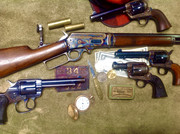So here's the deal: the harder your case necks get the more they resist deforming when squeezed. So Whitlock's technique is to take a steel mandrel about .02" smaller than the inside of the case neck (so if you have .222 inside diameter you'd be wanting about a .200 to .202 mandrel) He suggests that drill bits make good mandrels, and I got a nice set of bits in a great number of different sizes a couple years ago when browsing through Costco's tool area. You take the mandrel, put it inside the neck, squeeze the case neck closed in a vise, creating an oval-shaped case neck. So the more oval the shape, the softer was the neck. You get the idea -- wonderfully simple. You measure the small dimension, the large dimension, and get the difference. He has a nice graph showing the results on a variety of 223 necks getting different treatments. Whitlock says this works on any case with about a .012 neck-wall thickness as long as you find a mandrel about .02 smaller than the inside case neck diameter. For his batch of different treatments, some cases where he made 222's out of 223's were the hardest and had a large dimension of .252, a small of .242, for a difference of .01. His soft cases were flame annealed until danged hot and water quenched. These had large dimensions about .254, small of about .234 for a difference of .02 which he thought was maybe too soft. New brass came out about .018 difference and had dropped to .015 after 3 resizings.
Now for years I have occasionally annealed case necks on certain cases that I don't want to loose to neck splits. Somewhere along the line I read something that got me thinking about 7 seconds in the gas flame on the girl's kitchen stove was "about right". So I measured some cases, did my anneal deal, and discovered it had made NO DIFFERENCE. Took about 11 seconds, at which point the fingers were getting quite warm, before I had done enough heating to make a measurable difference in the softness of my cases.
This is great information for a fellow to have. I may be slightly embarrassed that my practice for many years was not doing anything to the anneal status of my brass. But thanks to Mr. Whitlock I now have a technique that lets me kinda' get a feel for where a batch of brass is, and lets me soften it up a bit so the necks last longer. So now I understand why I lost some cases to neck splits that I thought I shouldn't have lost: I thought I just hadn't done the anneal early enough. Nope, I hadn't done the anneal at all!
And I found out why Whitlock talks about his specific measurements working on cases of the right brass thickness. I tried some brand new 25-20 cases and these thin-necked critters don't hardly get out-of-round much when squeezed. Now 25-20 is not one I have neck-split troubles with: it was just one of the only ones I had handy where neck thickness was different than Whitlocks test specified, and where I happened to have new brass. I imagine you can make your own tests and figure it out if you have different brass neck thicknesses: you are just trying to compare what you have now with what new brass gives you, and also checking to see that your anneal job has actually made a measurable difference. Anyway, a very interesting idea and one we reloaders can put to good use. I'm sure I looked at this article back in '73 and blew it off as not of interest. Oh well, better late than never to discover this good info.

